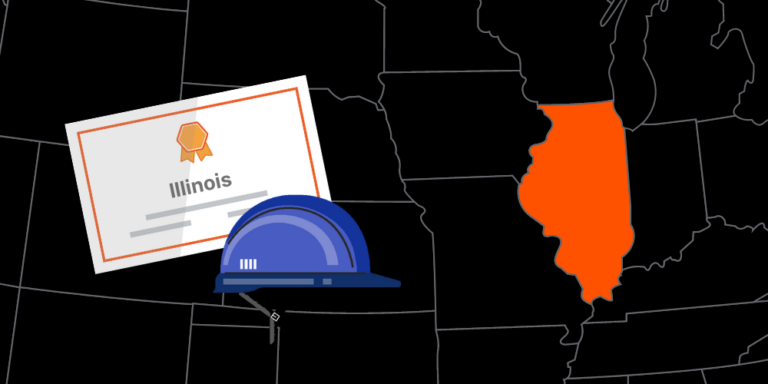— 6 min read
How to Get an Illinois Contractor License
Last Updated Jun 11, 2024
Last Updated Jun 11, 2024

Most states require contractors to get licensed in order to do construction work. But in Illinois, licensing for general contractors and most specialty contractors is regulated at the city or county level. The only trades licensed at the state level are plumbing and roofing.
In this article, we'll break down the Illinois contractor licensing requirements, with links to applications and other resources to make sure your bases are covered.
Table of contents
How to get a general contractor license in Illinois
In Illinois, general contractors are not licensed at the state level — each city or county sets its own licensing rules. However, they do need to register their business with the Illinois Department of Revenue. In addition, contractors that plan to work on plumbing systems will likely need to secure a plumbing license through the Department of Health. (Jump to plumbing licenses.)
Below, we'll cover licensing rules for general contractors and some trade requirements in the four most populous cities in Illinois. Check with the city or municipal government before starting any construction work to ensure your business is in compliance with local regulations.
Chicago
The city of Chicago requires licenses and registrations for general contractors, supervising electricians, brick masons, private alarm contractors, and many more. Contractor licensing is governed by the Chicago Department of Buildings.
There are five types of general contractor licenses in Chicago, each with a limit to the project size they can undertake.
- Class A - No Limit / $2,000 Annual Fee
- Class B - $10,000,000 / $1,000 Annual fee
- Class C - $5,000,000 / $750 Annual Fee
- Class D - $2,000,000 / $500 Annual Fee
- Class E - $500,00 / $300 Annual Fee
General contractors will also have to disclose their business structure and provide proof of general liability insurance and workers compensation insurance when applying.
The application, examination, and renewal processes are administered by Continental Testing Services, a private testing company. This company handles testing for all of the trades, including stationary engineers, brick masons, supervising electricians, crane operators, concrete masons, and more.
View Continental Testing Service's full list of Chicago contractor requirements by trade.
Stay updated on what’s happening in construction.
Subscribe to Blueprint, Procore’s free construction newsletter, to get content from industry experts delivered straight to your inbox.

Aurora
The City of Aurora requires most contractors to carry a license or register with the city. Licensing is governed by the Department of Buildings & Permits.
Here are the applicable trades and applications for each:
- General Contractor, Signage, HVAC, Electrical contractors license application
- Plumbing or Fire Alarm contractors registration application
- Fence or Pavement (private property only) contractors registration application
- Pavement (including aprons and right of way) contractors registration application
Different trades will have separate insurance requirements and application fees, but general contractors, HVAC, electrical, and roofing contractors can expect to pay $200 for a license application fee.
Joliet
Joliet’s contracting registration process is short and sweet. All contractors have to register with the Building and Inspectional Services Division:
To work in Joliet, contractors need to provide a certificate of insurance for a general liability policy naming the City of Joliet as a certificate holder.
Minimum insurance amounts:
- $250,000.00 Bodily Injury Per Person
- $500,000.00 Bodilly Per Occurrence
- $250,000.00 Property Damage Per Occurrence
There are also some additional trade-specific insurance requirements:
- A contractor working in the Public Right-of-Way: $10,000 Street Obstruction Bond
- Demolition Contractor (taking a structure down): $50,000 Wrecking Bond
- Plumbing Contractor: Illinois State Plumbing License (055 #)
- Electrical Contractor: City of Joliet Electrical License or license from another municipality
- HVAC Contractor: City of Joliet or another municipality HVAC/Business License
- Roofing Contractor: Illinois State Roofing License
- Siding Contractor: VSI (Vinyl Siding Institute) Certificate
Keep in mind that Joliet does require roofers and plumbers to carry the appropriate state license.
As of January 1, 2023, all electrical, plumbing, and HVAC contractors listed on a project must submit a Letter of Intent to the Building and Inspectional Services Division. View a sample Letter of Intent.
Rockford
Contractors looking to work in Rockford will have an easy go of it. There aren’t many licensing requirements, opting instead for registration. Rockford does expect roofing and plumbing contractors to carry valid Illinois-issued licenses and register with the city, however.
Demolition contractors have to apply for one of three permits, each with its own parameters and requirements.
There are some registration requirements to be aware of. For example, electrical contractors will have to register each year, to the tune of $25.
State licenses for plumbing & roofing
Only two types of contracting work require a state-issued license: plumbing and roofing. Below, see exactly the steps you'll need to take to get licensed.
Plumbing licenses
Plumbing in general is governed by the Illinois Department of Public Health (IDPH), which includes the issuance of licenses for plumbers, plumbing contractors, plumbers’ apprentices, irrigation contractors, and retired plumbers.
The difference between a plumber and plumbing contractor can be confusing, even as defined in state law. Generally, a plumber is someone who performs plumbing work as an employee, while a plumbing contractor is someone who does plumbing work under contract with another party (e.g. a homeowner, commercial property owner, etc.).
Applications & fees
- Plumbers' apprentice application. Fee: $100
- Plumber application. Fee: $175
- Plumbing contractor application. Fee: $150
- Irrigation contractor application. Fee: $400-1500, based on the number of plumbers required
- Retired plumber application. Fee: $25
Roofing licenses
Roofing licenses in Illinois go through the Illinois Department of Financial and Professional Regulation (IDFPR). All that’s required for a roofing license is that a qualifying individual apply and pass an examination.
This qualifying individual does not have to own the business — they must only be employed by it. This person will have to disclose criminal records, child support, and other personal information, however.
There are two types of roofing contractor licenses: limited and unlimited. Limited license holders are able to take on residential projects consisting of eight units or less. Unlimited license holders can take any roofing project.
The fee for both of these is $226.
Insurance & bond requirements
Roofing contractor insurance and bond minimums:
- Property damage insurance: $250,000 per occurrence
- General liability insurance: $500,000 for each occurrence of personal injury or bodily harm
- License bond: $10,000
Stay updated on what’s happening in construction.
Subscribe to Blueprint, Procore’s free construction newsletter, to get content from industry experts delivered straight to your inbox.

Penalties for unlicensed contracting in Illinois
The state takes a hard line on unlicensed plumbing and roofing contractors. Both can see hefty fines for contracting without a license.
For plumbers, a first offense can result in a $1,000 fine, but only if there are no violations of the Illinois Plumbing Code found. If there are violations, a contractor could see a fine of $3,000 for that first offense. A second offense can result in a $3,000 fine, and subsequent offenses can tally $5,000.
Unlicensed roofing can be just as steep: Each offense is punishable by a fine of up to $5,000.
Additionally, each individual municipality has the right to set its own fine and penalties, so it’s best to stay above board and follow any rules.
Do you need a license to file a mechanics lien in Illinois?
Even though almost all contractors need to carry some form of license or registration, Illinois does not explicitly require a contractor to hold a license in order to file a mechanics lien.
With that said, a 2005 court case found that two architects were unable to successfully foreclose on a lien because they did not carry the proper licenses. So, it’s highly advisable to carry any required licenses in your trade to fully ensure you can successfully protect your payments.
Was this article helpful?
Thank you for your submission.
92%
8%
You voted that this article was . Was this a mistake? If so, change your vote here.
Scroll less, learn more about construction.
Subscribe to The Blueprint, Procore’s construction newsletter, to get content from industry experts delivered straight to your inbox.
By clicking this button, you agree to our Privacy Notice and Terms of Service.
Categories:
Tags:
Written by
Tom Scalisi
57 articles
Tom Scalisi is a writer with over 15 years of experience in the trades. He is passionate about educating contractors and specialty contractors about the best practices in the industry. He has seen first-hand how education, communication, and preparation help construction professionals overcome challenges to build a strong career and thriving business in the industry.
View profileExplore more helpful resources

Contractor License Bonds: Everything You Need to Know
In order to perform construction work, many states require contractors to be “licensed and bonded.” What does that mean? Well, every state sets its own rules for contractor licensing, and...

Contractor’s Guide to License Reciprocity: Working Across State Lines
For many contractors, growing a construction business means taking on jobs in different states. Whether it’s to take a one-off project or to establish a new business location, working in...

Vermont Contractor License: Guide to Rules & Requirements
If you’re starting a construction business in Vermont or looking to expand your business from another state, being properly licensed to work is one of the first key steps. There...

The Maine Contractor License: Guide to Rules & Requirements
If you’re considering starting a contracting business in Maine, it’s important to know the rules and requirements for proper licensing. Maine takes a different approach to contractor licensing than most...